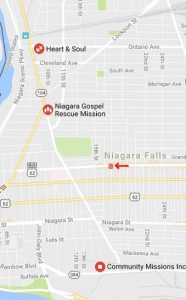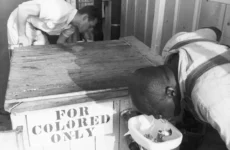A Roman Catholic priest who is proposing to locate what he terms a “not-for-profit restaurant,” run by volunteers, serving low cost meals to low income residents and free meals to veterans, is running into stiff resistance from Mayor Dyster and a self-appointed business group that calls itself Pine Avenue Redevelopment Project (PARP).
Since the 1701 Pine Avenue location, upstairs from the popular Carmine’s Restaurant, is zoned for such a purpose, in the final analysis, if the good Father decides to follow through with it, there’s little those entities can do to prevent what’s been termed a new soup kitchen from being established at that location.
City Hall issued a “Statement From Mayor Dyster on Pine Avenue Soup Kitchen Proposal” soon after the issue became public, which said, “Today my office received a letter from the Pine Avenue Redevelopment Project (PARP) informing my administration that they had become aware of a proposal for the creation of a soup kitchen meant to replace an existing restaurant on a prominent corner in the center of the city’s historic Little Italy restaurant and business district.
“In a city where too often our residents are in need of a helping hand, no one recognizes the need for such a facility more. However, it is this administration’s position that such a project at the proposed location is not conducive to the viability of the Pine Avenue Business corridor, and the efforts already underway by the Pine Avenue Redevelopment Project. This 12-member board, composed largely of local small business people, has worked diligently to promote and restore the safety, beautification and most importantly, the economic redevelopment of Pine Avenue; and the city has pledged its support of the efforts of PARP to revitalize this crucial neighborhood business district.
“While we thank Father Mazur and encourage his efforts, they have been carried out without consultation and collaboration of the administration, PARP and the many similar organizations within the City of Niagara Falls that have long provided similar services to address the needs of our community. It is my sincerest hope that all parties can work together toward the use of an alternative location that would be mutually beneficial for all involved.”

The other three overburdened soup kitchens of Niagara Falls, all of which are at least a half hour walk from the city’s east end, are all located a good distance from the new low cost eatery strategically located on Pine Avenue.
According to recent US Census figures, 40.6% of children in Niagara Falls live below the poverty level, nearly twice the state average of 22.5%. The median income for a household in the city was $26,800 (New York State, $55,246), and the median income for a family of four was $34,377 (NYS, $72,170). 25.3% of the population of the city of Niagara Falls were below the poverty line, compared to a national average of 13.5%.
A partnership between the Oishei Foundation and the University at Buffalo’s Regional Institute determined the following in 2013: Roughly 22,425, or nearly one out of every two residents, are “doing poorly or struggling financially,” about 10,900 Niagara Falls residents, or more than 20 percent, live on incomes below federal poverty levels and another 11,525 city residents do not fall under the federal poverty threshold, but earn less than 200 percent of that line, making them eligible, in many cases, for most public benefits.
In noting that Fr. Mazur neglected to engage in “consultation and collaboration” with his administration, Dyster, who is entering his 10th year in office, and holds a PhD in International Relations and Law, seems to have a tenuous grasp of the meaning of the Establishment Clause of the US Constitution, which enforces separation of church and state.
In addition, Dyster’s policies over the years, enabling the removal of vast amounts of wealth to state agencies like NYPA and State Parks without so much as a mild protest, in many cases in fact facilitating the theft, and his profligate and wasteful spending patterns, such as $585,000 for a worthless piece of “public art”, contributed greatly to making the city destitute and populated by undernourished families.
Until Dyster and other local officials are replaced by real leaders who are willing to fight for their city, and at least try to reclaim resources of tourism and hydropower that Albany has commandeered, the need for soup kitchens such as Father Mazur’s is only going to increase.

Father Jacek Mazur (right) has been entrusted by his bishop to unite five ethnically diverse, disbanded parishes into the new Divine Mercy Parish in Niagara Falls, N.Y. He chose to start a restaurant or if you prefer a soup kitchen, in the tradition of the founder of his religion, where no one will go away hungry. Here, he shares a laugh with Fr. Kazimierz Chwalek, MIC, left, during a visit to Eden Hill.



















